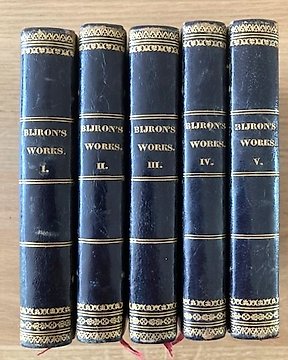
Lord Byron - The Works of Lord Byron. Complete in Five Volumes - 1842
Nr. 84177881

Nr. 84177881

"Don Quixote" by Miguel de Cervantes Saavedra, translated from a 1605-1615 Spanish first edition, lithographs by Jose Narro - Folio Society, London - 1961 edition - complete in 2 volumes - 25cmx18cm - condition: very good, minor rubbing to spine ends, complete with all lithographs
Don Quixote[a][b][c] is a Spanish epic novel by Miguel de Cervantes. It was originally published in two parts, in 1605 and 1615. Considered a founding work of Western literature, it is often labelled as the first modern novel[2][3] and the greatest work ever written.[4][5] Don Quixote is also one of the most-translated books in the world[6] and one of the best-selling novels of all time.
The plot revolves around the adventures of a member of the lowest nobility, a hidalgo[d] from La Mancha named Alonso Quijano, who reads so many chivalric romances that he loses his mind and decides to become a knight-errant (caballero andante) to revive chivalry and serve his nation, under the name Don Quixote de la Mancha.[b] He recruits as his squire a simple farm labourer, Sancho Panza, who brings a unique, earthy wit to Don Quixote's lofty rhetoric. In the first part of the book, Don Quixote does not see the world for what it is and prefers to imagine that he is living out a knightly story meant for the annals of all time. However, as Salvador de Madariaga pointed out in his Guía del lector del Quijote (1972 [1926]),[7] referring to "the Sanchification of Don Quixote and the Quixotization of Sancho", as "Sancho's spirit ascends from reality to illusion, Don Quixote's declines from illusion to reality".[8]
The book had a major influence on the literary community, as evidenced by direct references in Alexandre Dumas's The Three Musketeers (1844),[9] and Edmond Rostand's Cyrano de Bergerac (1897)[10] as well as the word quixotic. Mark Twain referred to the book as having "swept the world's admiration for the mediaeval chivalry-silliness out of existence
Hogyan vásárolhatok a Catawiki-n?
1. Fedezzen fel valami különlegeset
2. Tegye meg a legmagasabb licitet
3. Fizessen a biztonságos és védett rendszert használva